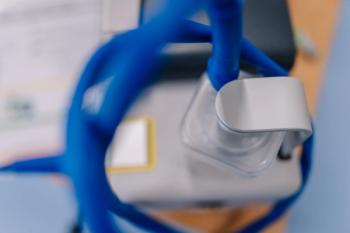
Dissolution of Screening Committee Sets Back DMD Newborn Screening Efforts
Absent a federal committee’s recommendation, Duchenne muscular dystrophy advocates are trying to get states to adopt screening programs.
The Duchenne muscular dystrophy (DMD) patient advocacy community is retooling its strategy to expand newborn screening after a key government advisory panel was disbanded by the Secretary of Health and Human Services.
In April, Secretary Robert F. Kennedy, Jr., eliminated the Advisory Committee on Heritable Disorders in Newborns and Children (ACHDNC), which makes recommendations about newborn screenings for genetic disorders. The move came just one month before the agency was scheduled to consider whether to add DMD to the
Paul Melmeyer, MPP, the executive vice president of public policy and advocacy at the Muscular Dystrophy Association, said DMD was jointly nominated for review by his association and Parent Project Muscular Dystrophy. He said he believed the package of data submitted in support of newborn DMD screening made a strong case.
“We were certainly very hopeful that we would have gotten a favorable vote and a recommendation from the committee to the secretary to add Duchenne onto the recommended uniform screening panel,” he said.
Newborn screening is important because the disease is rare, and the available therapies can only slow down — not reverse — the progressive muscular weakness associated with the disease. Melmeyer said there is strong evidence to suggest that muscle damage begins soon after birth, or possibly even in utero. If patients with DMD can be identified at birth, interventions can start almost immediately. Absent screening, he said, patients are rarely diagnosed before age 4, by which point the patient will have already experienced years of irreversible effects.
“[Screening] gives our clinical community the chance to intervene in the progression of Duchenne muscular dystrophy much sooner within the course of the disease,” he said.
The screening itself involves a blood test measuring creatine kinase (CK) levels. If a patient has particularly high levels of creatine kinase, they can then be referred for additional testing.
Without a place on the RUSP, only a few states screen newborns for DMD. Ohio and Minnesota screen for DMD, though the latter only started this year. New York and Massachusetts have adopted a plan to screen patients, and they are in the process of putting their programs into place.
Florida and Texas also recently moved to screen newborns for DMD, although Melmeyer said both of those states made their screening contingent on the appropriation of funding for screening. That can be tricky, since states need access to specific lab equipment to screen for creatine kinase and, in some cases, may need additional laboratory space in their state lab.
If DMD were added to the RUSP, newborn screening would likely spread much more quickly, Melmeyer said. That’s because having the ACHDNC’s endorsement is an indication that the newborn screening experts on the panel have reviewed the data and concluded that the benefits of screenings outweigh any risks.
“It's very thorough, and the states know it's very thorough, and consequently they can then have the confidence that adding, in this case, Duchenne muscular dystrophy, to their panels is the right thing to do,” he said.
Melmeyer added that once a screening is approved for the RUSP, states can apply for federal grant funding to help defray the cost of setting up screening.
Since the surprise dissolution of the ACHDNC, Melmeyer said he and others in the DMD community have continued to push states to adopt screening on their own. However, he said the MDA and other advocates are still hopeful they can get DMD on the RUSP even without the committee.
“Now we don't necessarily know what this would look like, or what the pathway would look like, or who would be involved,” he said. “This is unprecedented. This has never happened before.”
Melmeyer said he and others believe the law itself does not require a recommendation from the ACHDNC. The Secretary of Health and Human Services could theoretically unilaterally add DMD to the screening panel. If Kennedy looks at the evidence supporting screening, Melmeyer said he is optimistic the data will be compelling.
“We are hopeful that with that data in hand, the secretary would still then move forward with adding Duchenne onto the RUSP,” he said.
Newsletter
Get the latest industry news, event updates, and more from Managed healthcare Executive.























